
59 minute read
NZPF CoNFereNCe 2021
YOuR EASIEST funDRAISER EVER?
Two years of fundraising disruption caused by Covid-19 have left many schools facing revenue gaps. One intriguing solution involves accessing the hundreds of tax rebates available to families in practically every school community.
SIncE ThE LAw allows donation rebates to be claimed back by parents from the IRD, it’s possible to ‘recycle’ these as a further contribution. In effect, donation rebates can be re-gifted to the school at no extra cost to the donor.
This can be a recurring process. Using the magic of compounding returns, an initial $100 donation can grow to over $140 over four years.
Automating the rebate process. The stumbling block is complexity. Claiming donation rebates, managing receipts and submitting them to IRD in the correct format is a huge hassle for most parents. For many, it’s not worth the effort to claim just a few tens of dollars back. So they choose not to, and leave thousands unclaimed with IRD each year.
Yet for a school, those unclaimed donations represent an ongoing revenue stream that has never been tapped.
To help schools fill their funding gaps, Kindo has developed a new service. It brings together Kindo’s integrated admin management system that is already set up to manage donation receipting for schools. The system has now been updated to facilitate the re-gifting of donation rebates.
By partnering with TaxGift and Supergenerous, Kindo has made donation re-gifting possible with the click of a button. Instead of claiming back their donation directly with IRD, parents are given the option to leave the rebate with the school, as a new donation gift for subsequent years. This means parents are able to increase school support without paying a cent more.
A simple way to fill the funding gap. For schools already using Kindo for donation collections and receipting, it’s simple to add an option for parents to re-gift their rebate. Kindo’s partners – Supergenerous and TaxGift – handle the process with the IRD, and pay the rebates directly to the school’s bank account.
Schools that aren’t with Kindo – or aren’t yet using the Kindo platform for donation collections and receipting – can still access donation rebates. Kindo can set them up to access donation rebates going forward. But schools need to act fast. 10 December 2021 is the final date for setting up donation rebate gifting with Kindo in time for 2022. For more details visit www.dothemath.co.nz or call 0508 4KINDO.
NZPF coNFErENcE 2021
Liz Hawes Editor
Photolife PHotograPHy
Conferences in the time of CovID, are rare. Plans for the 2020 Trans-Tasman conference were locked off as both countries locked down. This year, as community cases again surged in various Australian States, hopes of reviving the Trans-Tasman conference fizzled like the last balloon at the end of a cracking good party.
uNForTuNATeLy, AoTeAroA’S CovID free party has also fizzled but early in 2021, we were in high spirits and resolved to appease the conference cravings of school principals in our own backyard. It would have to be a hastily organized affair. A national conference generally takes a full calendar year to organize and NZPF had less than 8 months.
The organizing committee, efficiently led by Jill Corkin, retired principal of Snells Beach School, Usain Bolted out of the planning blocks and set to work. Rotorua was chosen as host city and the Energy Events Centre, adjoining the splendid Lake Rotorua and historic Government Gardens, the venue. An avalanche of registrations rocketed their way to the conference website. Principals from across the motu made clear their intentions to turn out in record numbers.
On August 2, 2021, six hundred principals responded to the call of the kaikaranga and filed in to the warmest of welcomes from leaders of Ngati Whakawe – Te Arawa Tāngata Whenua after which the Kapa Haka group, from Rotorua Intermediate School, warmed the hearts of the excited delegates with a spirited, uplifting and polished performance. It is unlikely that a single principal entertained the thought that in exactly two weeks’ time, the whole of Aotearoa would be plunged back into 2020 style level 4 lockdown.
MC Jehan Casinada, well known current affairs and investigative journalist, introduced the theme of the conference, before handing over to NZPF President Perry Rush.
He took the three threads of the conference theme, ‘Power, Passion and Pace’ and asked a question of each: Where does the power come from? How do you keep the flame alive? How do you respond to constant change? He invited his audience to think about these questions as they immersed themselves in the unfolding conference programme.
PERRy RuSH – NZPF PRESIdENT ‘What a privilege it is,’ said Rush proudly, ‘after enduring the global pandemic, to be gathered here together in this magnificent Rotorua Events Centre. We are one of the few countries in the world that can host a huge indoor event like this without wearing masks!’ Rush may have chopped these words into his scrambled eggs two weeks later, but right at that moment, it was true. We were living the dream! We were in the moment – about to conference like crazy! He acknowledged the sector leaders in attendance, invited guests and Minister Jan Tinetti, who was forced to seek a special pass from the Prime Minister. Her speaking slot clashed with the normally ‘not-negotiable’ Monday Cabinet Meeting. He also paid homage to Australian colleagues who were unable to attend conference due to the COVID delta variant ravaging several Australian States. In welcoming the 600 tumuaki of Aotearoa, he congratulated and thanked them for being beacons of strength throughout the 2020 COVID lockdown and remarked how proud he was of their extraordinary response. With that behind us, it was time to get our muscular leadership into some pressing issues, he said. There are two important conversations underway in NZPF President Perry rush addresses the conference our sector, he stated. These are curriculum achievement and the challenges of dealing with young people in crisis. He explained that while work was underway with the second challenge, getting real traction was difficult and progress was not unfolding at the pace expected. On the first issue, he said, we need more vigor and to be very clear about curriculum content and how to measure achievement. Ministry support was the key to making progress. He quoted former Secretary of Education, Peter Hughes, who said ‘Real leaders are principals who lead schools. The Ministry’s
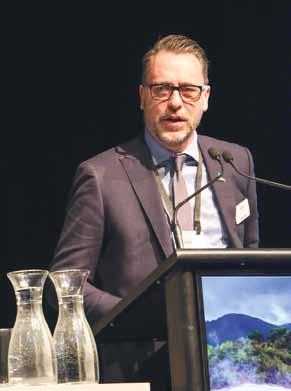

Principals connecting and reconnecting over social hour at the conference
role is to be the stewards and back them to win.’
‘Minister Tinetti [as a former school principal] understands our challenges,’ he said, ‘but we are not there yet. We will make gains, however, when we are strong together.’
He illustrated his point saying that when NZPF asked principals to tell their own stories of young people presenting with violent behaviours, the trauma stories poured in. ‘After lobbying for support for over ten years, when these stories landed on Ministers’ desks, support ramped up,’ he said.
He explained that the Intensive Wrap-around Services have been stream-lined, the Mana Ake programme, which has been so successful in the Canterbury region, has been extended to other regions and access to alternative education has been made simpler. Much urgent help is still required, he said, and teachers are not trained therapists who can counsel the growing number of young people presenting with troubling complexities. We need expert therapists in schools and more alternative education options, he said, if we are to cease excluding these vulnerable young people.
On enrolments directed by the Ministry, Rush said NZPF had sought a legal opinion on the responsibilities of principals to keep all staff and students safe while accepting directed enrolments of students with a history of violent and threatening behaviour. The legal opinion indicated that the Ministry must undertake a risk management analysis and construct a suitable risk management plan of support, before directing an enrolment which threatened the safety of others. The Ministry did not agree with the opinion, he said. Rush then challenged Minister Tinetti saying ‘Is this a Ministry that is backing principals to win?’ Turning to achievement issues, Rush quickly dismissed the value of international league tables like TIMMS, PIRLS and PISA surveys and directed his audience to look at our own national data. The story is not good. On science and mathematics there has certainly been a drop in achievement levels. ‘We’ve been placing too little emphasis on teaching knowledge and too much on teaching how to learn,’ he said. He explained that we don’t understand what ‘localised curriculum’ means. Localised Ngāti whakaue – Te Arawa Tāngata whenua welcome the 600 NZPF principals warmly
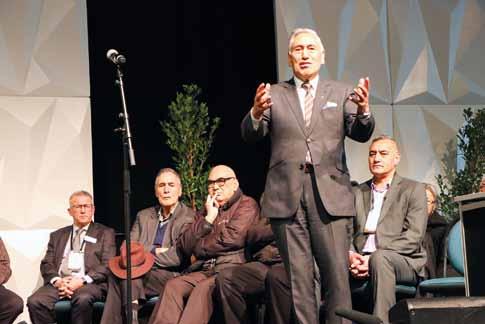
curriculum has become what you choose to cover, he said, at the expense of teaching the national curriculum. Consequently, there is no national coherence, as each school invents their own curriculum.
He had further criticism of the way ‘student agency’ has become such a focus. ‘Sure, we want kids to be at the heart of learning, but it is not appropriate to leave kids to choose what they learn. There is a place for deliberate, intentional teaching,’ he said, with a warning that we must not fail to deploy clear curriculum goals.
He suggested it was time to audit the curriculum knowledge of senior teams and to power up staff with PLD. ‘Let’s be brave, keep your practice-based approach to the fore and don’t be beige! Be bright, bold and energetic and unafraid to make a mistake,’ he said.
He concluded on a high note telling the principals gathered to enjoy the conference, to network and to have fun!
Hon. jan Tinetti, Associate Minister of Education Minister Tinetti opened her address with an acknowledgement of the wonderful work principals do in their schools saying, ‘You and your staff are the ones making magic in our schools.’
‘I tautoko the words of your president,’ she said, ‘and agree, I too have never been so proud of the teaching profession as last year. There are so many untold success stories. I know it all comes down to leadership and I know how hard it is to lead a school through a crisis.’
She thanked the principals for recording their trauma stories and noted the challenges they bring. ‘Hearing directly from you, informs me,’ she said.
Her address would update principals on the topics she raised at the NZPF Moot, earlier in the year, she explained. These include curriculum development, attendance and learning support.
Curriculum Refresh & Support This will be a five-year project she said and has been allocated the biggest Budget that curriculum development has ever received. The work is based on the principles of equity, trust and coherence, she said. Also integral to the future of curriculum development, she said, are the principals of Mātauranga Māori [an indigenous body of knowledge that arises from a worldview based upon kinship relationships between people and the natural world.]
A working group was announced last week, she said, to establish the Curriculum Advisory, a service which principals have been advocating for. The group will challenge the shortfalls of the current curriculum and ensure inclusivity. There will be close scrutiny of the literacy and numeracy strategies to ensure clarity of what learners know, understand and do. She agreed with the NZPF President, who had expressed his concerns about the lack of clear national goals, which are contributing to the drop in achievement. Attendance She acknowledged that it was the most vulnerable students who had the lowest attendance rates, and this indicates a system failure. ‘I won’t blame parents,’ she said, ‘we must move to a solution focus.’ She noted that the URF (Urgent Response Fund) had shown improvements can be made and so Government has allocated $20 million over four years to develop appropriate systems to improve attendance.
‘Attendance systems that operate closely with the school community work best,’ she said, ‘where trust relationships can be developed locally.’ What has been missing is the resource to achieve that. Attendance systems need to be redesigned and we will be working at pace on this issue, she told her audience. ‘I am motivated to get rid of barriers for you and that’s why we have extended Mana Ake to provide more school counsellors; introduced school lunches; funded schools in lieu of charging school donations; allocated $600million to school property to address overcrowding and to create quality environments for schools,’ she said.
Learning Support Minister Tinetti said learning support had always been her passion and she was delighted to be allocated this delegation. ‘We have learners who thrive and those who don’t, and we want all to be successful,’ she said. ‘I know how hard it is to make suspension decisions,’ she said, ‘I know how stressful it is for everybody and no one makes that choice lightly.’
She noted that the Government has invested high levels of funding in learning support, yet we still have issues. ‘The problems are wider than just pushing money at it,’ she said, ‘and so we have a plan for the short, medium and long term,’ she said.
In the short term the intention is to respond to the immediate pressures – the cry for help. She said she has requested funding of $17.7million for psychologists for up to 95 students annually. ‘This has been hard work because the budget is a year-long process,’ she said, ‘but I will keep trying hard.’ Another $75.8 million has been allocated to counsellors for over 100 primary schools, and there will be more funded in the next budget. There are now 7,500 young people in alternative education pathways.
She addressed Te Tupu Managed Moves, which NZPF has been advocating for, saying that although it is not suitable in all cases, she will be looking at evaluation findings and consider expansion of the programme.
Later in 2021 her intention is to implement the new referrals process, as quickly as possible.
In the long term there will be a review of managing high needs students. This will include neurodiverse supports. ‘Learning support has not been reviewed in 20 years,’ she said. The focus on the review will be inclusiveness and moving away from deficit thinking. The review is yet to be approved by Cabinet.
‘We do not want education and learning support separated
minister Tinetti outlines the government’s progress on the Curriculum refresh, Attendance and Learning Support
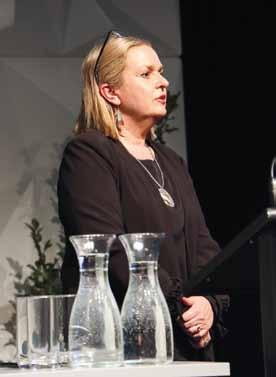
from children’s other needs,’ she said. ‘We will use the disability review to bring education into the mix,’ she said.
She made it clear that she does not want learning support provision prone to political whim, emphasizing the importance of getting it right. This, she said, will mean working in partnership with the sector so that all students can reach their potential.
dr Michelle johansson The title of Dr Johansson’s address, ‘What will it take to change the world for brown scholars?’ piqued the interest of the audience before this dynamic and powerful wāhine even took the stage.
Johansson is a Polynesian educator, of Tongan and Danish descent, Creative Director of the Black Friars theatre company and Head of School at Ako Mātātupu – Teach First NZ, which develops outstanding people to teach in low-decile schools. Black Friars, she explained, is about activating our heritage literacies to grow future leaders and hold courageous spaces for our young people to walk confidently in both worlds. ‘We teach drama and music in schools and in the University,’ she said. ‘As drama teachers we know that kids remember what they feel, not the lesson on the calculation of Pi,’ she said, acknowledging that the education system has not served Māori and Polynesian kids well.
The seventh child of fifteen, Johansson was raised by her grandmother. ‘My family was poor, and my mother worked on the factory floor so that I could stand here today, and my children could lead the future,’ she said.
The statistics are clear, she explained. The lower the decile, the browner the population. When you look at children in hardship, it is Māori and Pacific Island children who dominate the numbers. Student stand-downs and those with chronic health issues are predominantly brown kids. Māori have the highest suicide rate (one quarter of suicides are Māori) and self-harm rates and half of those incarcerated are Māori. Most of those in prisons are poor people. Unemployment statistics, she said, are ambiguous because statistics include only reported unemployment, whereas many may be caring for others at home. University students include 64% of Asian students. 59% of Pākehā/European, 34% of Māori and 33% of Pacific Island students. Some 40% of Pacific Islanders are living in crowded housing. ‘My family was a big family which makes us stronger, but houses aren’t built to accommodate big families,’ she said.
Any systematic change to these abysmal statistics can only occur through multiple and simultaneous interventions, said
The lower the decile, the browner the population, says Dr michelle Johansson
Johansson. She quoted Keri MilneIhimaera who said, “Those who do nothing are complicit in it.” ‘If no one cares, the boy who isn’t fed and has no roof over him, will grow into the man we fear,’ she warned. She was clear that it is futile to engage in the blame game because, ‘We have to save us,’ and, ‘education can make the difference.’ There are six lies, she said, that need to be challenged and questioned because they are commonly held beliefs and a barrier to progress. These include: 1. New Zealand is free, fair and equal. 2. Education is an equalizer. 3. People are all treated the same. 4. It’s just that long brown tail . . . 5. If you just work a bit harder . . . 6. I did it so everyone can. ‘We have to believe, not only that these things can change, but that we have the power to change them. So, what can we do?’ asked Johansson.
The first thing we can do is ‘flip the script’ she said. Our kids are not failing, we are failing them. Secondly, advocate for our kids and amplify the message. Third, serve them. Think ‘O le ala i le pule o le tautua’ – ‘The road to leadership is through service’. Finally, think ‘talanoa’ and ask what do you believe education is for? Think about those Pasifika communities and ask how to engage them and use their knowledge and cultural practices to set the right school culture for Pasifika students to thrive in.
Johansson concluded her address with her own poem, ‘Ten
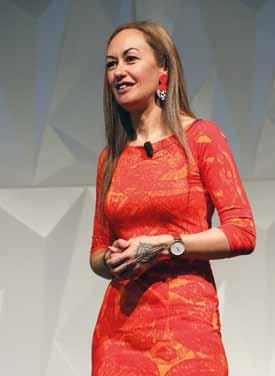
SPARXis an online game to help young people cope with feeling down, worried or stressed. SPARXisFREE- all you need is a computer, tablet or mobile with an internet connection.

New! SPARX version 2 out now • SPARX.ORG.NZ
SPARXIS AN INTERACTIVE GAME-WORLD DESIGNED TO HELP YOUNG PEOPLE WHO ARE FEELING DOWN
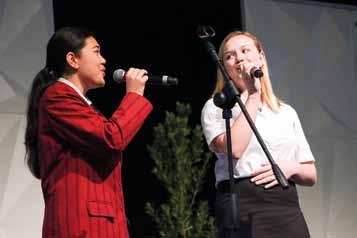
Principals are serenaded in a duet by two outstanding young performers, Nikau grace Chater (L) and Jasmin Hulton (r) The Forte Choir of western Heights High School brought humour and fun to their performance
pieces of advice for the teachers of young brown scholars’
1. Raise the bar. Don't dumb it down because they are brown, respect them enough to expect their best, and when they bring to you less, say THIS is not good enough, not YOU are not good enough. They've been told that enough and it's rough and they're tough, but the stuff that they're made of is enough. 2. BELIEVE unfailingly in their limitless potential. They will look in your eyes and know if you are lying. 3. Feed them. Literally. Feed them. Feed their minds, feed their mouths and feed their hunger for justice. Break bread with them and remember that when you take communion a covenant is made and there was a promise in that supper, that blood shed and shared means sacrifice.
We teach people to save lives
In a Fun & InteractIve envIronment
• FASE “First Aid for the School Environment”
– 4Hr Basic First Aid Course for general teaching staff • 1 Day Workplace First Aid – 8hrs for designated
First Aiders and office staff • 2 Day Workplace First Aid – for Gateway/Star students. Units – 6400, 6401, 6402 • 2 Day Outdoor First Aid – for staff leading EOTC activities & Outdoor ed. students. Units – 6400 series & 424
nZQa cateGorY one ProvIDer For all aid course information please call email us on rose@first-training.co.nz or call us on 0800 1ST AID or 09 838 2110 www.first-training.co.nz
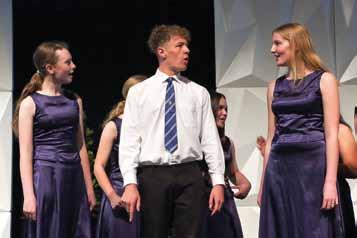
4. Laugh. Laugh at yourself. But not at your jokes. Your jokes are dry, but you are funny – And in laughter there's power; and in humour there's humility – and this ranks higher than their academic standing or rank score – it is more. 5. No one ever changed the world by yelling at it. Fear might change their behaviour but respect will change their mind. 6. Know that you are in the presence of warriors. They have fought. They are fighting. There are battles behind their eyes; and you cannot possibly understand the arms they bear, the scars they wear. Don't make the classroom another trek behind enemy lines. Sometimes they need a soft place to land, a safe space to stand, someone willing to understand.
And if this is not the lesson you planned? perhaps it is the lesson YOU need. 7. Be the grown up and own up when you're wrong, be strong enough to fail sometimes, to ask for help sometimes. Be the mistake maker, the risk taker, give them permission to do the same. Be fallible, be malleable – take the shape of the tool that's needed coz ako means that if they’re not learning then you’re not teaching and if nothing ever changes, then nothing ever changes. 8. When they rage at you – and often they will coz often they're full up and fed up with their lives and they throw words like knives at your feet – don't throw them back. Pick those knives up and see them for what they are. Not weapons thrown to hurt YOU but to relieve THEM. They could not carry them anymore. And you? Pick the knives off the floor, throw them out of the door and begin again. 9. Defend them. Inherent in their postcode. You will hear stories of failure that's prevalent in the pigment of their skin and Don't let that shit happen on your shift. It is your duty to tell a new story. 10. Stand WITH them and FOR them and BY them. Speak with them and for them. See them and know them for who they are. Hold them – in your arms, in your thoughts, in your prayers.
Don't let go. Fight. Fight for them. And keep fighting. They are worth it. And if you back them when they're 15? They will have your back for life.
When the applause subsided, MC Jehan Casinada thanked Johansson for her beautifully balanced address and had one last question, ‘In the media and social media environment young people are hearing stories and narratives. What do you say to those drowning in toxic narratives?’
Johansson answered, ‘It depends on the young person. The internet allows delusional information to circulate but we have to know where we can make the change. If school is a safe place, schools can counter those toxic messages.’
Filivaifale jason Swann While introducing his topic, A Pasifika Worldview in Aotearoa, Filivaifale Jason Swann, principal of Otahuhu Primary School, acknowledged the Tangata Whenua, his own Samoan culture and had a special greeting for all Cook Islanders in the audience. ‘Kia orana,’ he said, ‘It is Cook Islands language week! It should of course be every week because all Cook Islanders should be able to live and learn in their own language. I mean, you don’t hear of builders having “hammer only Thursday” do you?’ This one quip gave the audience a quick insight into Swann’s Pasifika world view.
‘The term Pasifika,’ he said, ‘includes recent migrants or New Zealand born Pasifika people of single or mixed heritage. While identifying themselves as Pasifika, this group may also identify with their ethnic specific Pacific homeland.’
‘Each of the Pacific countries has a different language and so children’s names are not likely to be English names,’ he explained.
‘If you want to connect with Pasifika children, then first pronounce their names correctly,’ he said. ‘You will have children in your school who have had their name gifted to them, which makes it very precious, so if you butcher their name, you butcher the relationship.’
He took his audience on a quick trip around the Pacific then showed them how the Ministry categorises Pasifika. The Ministry list includes 18 subgroups. These are Samoan, Cook Islands Māori, Rarotongan, Tongan, Niuean, Tokelauan, Fijian, Australian Aboriginal, Hawaiian, Kiribati, Nauruan, Papua New Guinean, Pitcairn Islander, Rotuman, Tahitian, Solomon Islander, Tuvaluan and Ni Vanuatu.
One of the tragedies, when working with different cultures, is that we want to categorise everyone. We expect that all Māori are one group. We think all Pasifika kids are just one group too. But this of course is not the case. Swann explained that in his multi-ethnic school in Otahuhu, for purposes of Ministry requirements, he is steered towards categorising his children as one ethnicity or another. Many families are mixed ethnicities, he said. They may have multi-ethnicities or a Māori parent and a Samoan parent. So how are they categorised? Mostly, a child of mixed ethnicity, that includes Māori, will be assessed as Māori. That is worth thinking about, he challenged the audience.
‘How does your school incorporate biculturalism and multiculturalism? Do the children and young people in your school see themselves in your school?’ he asked.
Pasifika peoples have lived in New Zealand for over sixty years and have contributed to many parts of New Zealand society. Think of the All Blacks, Super Rugby and netball. If you take out the Pacific Islanders those teams would look very different.
When you look at the census data, you will see that the biggest group of young people in New Zealand is Pacific Islanders. If they are successful, New Zealand will be successful. If the opposite happens, we all pay for that pain economically and socially.
He then offered a brief history of Pacific Islanders’ experiences in New Zealand. In the 1950s New Zealand wanted Pacific Islanders to come to New Zealand to work in the factories and fields, he said, but by the 1970s things had changed. Suddenly, overstayers were targeted for deportation. Less than one third of the overstayers, at the time, were Pacific Islanders. The other two-thirds were Americans, British people and others, but only Pasifika people were ruthlessly pursued. The now infamous dawn raids were the result, for which Prime Minister Jacinda Ardern has just this year apologised. That is after fifty years of relentless activism and railing against racism by the Polynesian Panthers. The Pacific Education Plan was next on his list and he quickly noted that the second action on the plan was to reduce discrimination and racism. ‘Fifty years later,’ he said, ‘and we are still doing it.’ The plan is a ten-year plan, which is pleasing and hopefully will have continuous funding irrespective of any change in government. That said, if you are a pessimist, then ten years is a long time to do nothing. Schools have the power to look positively on the contributions of their Pasifika children and communities and value their culture. This would go a long way to helping eliminate racism and discrimination, he said.
He urged his audience to think about and critique their own biases and unconscious biases; to critique media reports and be aware of the ‘Pasifika Add On (PAO) effect’. Sometimes, he said, policy on Pasifika issues is written in invisible ink.
Our young are master navigators. They want the collective

Filivaifale Jason Swann took his audience on a journey through the Pasifika world unable to resist, President Perry rush joined the Photolife crew on the stage for the sing-along and show

to have success – the whānau, the village, the nation, the aiga – because collective success is central to what drives us. All the same, many young Pasifika kids wear a mask. ‘It’s a game they play,’ he said, ‘to get through school, family, church, part-time work and sport. They are masters at navigating these different paths and as a profession we need to understand this and be smarter navigators with their learning.’
One way that schools can do better is to build closer, more positive relationships with their parents and families. ‘Don’t just call parents in to tell them that their kids are failing,’ he said, ‘Bring them in to talk about the great things their young people are achieving.’
To illustrate his point, he used a joke.
Son: Dad, there’s a small get together at school tomorrow!!!
Father: Small get together??? How small?
Son: Only me . . . you . . . and the principal . . . He described another option, the talanoa, for positive engagement with Pasifika communities. ‘A talanoa is a free-flowing conversation, sharing stories, thoughts and feelings,’ he explained. ‘On my school Board, we never vote. We reach consensus,’ he said.
‘In my culture, we use the concept “Vā” to describe different relationship spaces, or the connections and space between us, which almost always includes the sharing of food,’ he explained. There is Teu le vā, the relationship space; Vā fealoa’i, the respectful space and Vā tapuai, the sacred space.
‘If you are having a meeting with a Pacific Island person or group, then take the time to connect over food. Eat together, share together. That puts you all on the same level. Conversations will flow and connections will be made. From here relationships will grow,’ he explained.
Tautai ole Moana [Way-finders of the Ocean] is a programme that can help you, he said. It is intended to strengthen the capability of principals and their leadership to improve outcomes for Pasifika learners. It provides principal mentors to help you with your strategic planning and give you knowledge of the Pasifika world. It assists you to navigate the best learning approaches to support our young people to be successful. It has been well researched and this PLD is funded. Already there are two clusters of principals engaged in the programme and there will be more to come, he said.
He encouraged his audience to think about a Pasifika world view and ask themselves what that looks like to them. He described his own family as an example of how his world view was shaped.
‘My mother is European, the youngest of three, she is vibrant and the life of any party, whilst my father is Samoan, the youngest of fourteen, and a consummate diplomat. They raised me and made me successful. I wanted to succeed because that makes all my family successful.’ One characteristic of Samoan life is that the kids will do anything for their parents, he said, and my mother is acutely aware of that. Generally, after church, we all have lunch at my parents’ house. For a change we once asked her where we could take her out for lunch. She answered, ‘Rarotonga!’ He then showed his audience slides of his mother enjoying her lunch in Rarotonga, fully funded by himself and his siblings. Devotion to mothers travels a long way! Married with seven children of his own, he has a granddaughter born in Singapore who has already travelled the world. ‘My question of myself is how does what I do affect this baby?’ He finished by thanking his audience for engaging with his address on a Pasifika world view in Aotearoa and encouraged them to consider some of the practical ways they can better understand and support Pasifika young people in their schools. Day two of the conference opened with a surprise no one expected. The audience was introduced to two young women, Nikau Grace Chater (13 years)
Sir Ian Taylor hammers home the message that from Rotorua Girls’ High School and Science, Technology and mathematics are part of a Jasmine Hulton, (14 years) from John much bigger world view called mātauranga Paul College. The two are trained singers and have only recently joined up to sing together. Across a medley of half a dozen popular songs, a duet and a few well-known operatic pieces, they sang to us in English, Māori, Samoan, Italian and French. The exquisite power and clarity of their voices had the audience hushed. The principals were spell-bound to the end when, as one, they sprang to their feet in collective ovation to these remarkably talented young women. Sir Ian Taylor Globally respected as a successful entrepreneur, designing graphics for major world sporting events through his Dunedin based company ARL (Animation Research Limited), Sir Ian Taylor is equally passionate about his own Māori heritage and the journey his ancestors took to settle in Aotearoa New Zealand. Motivated by his drive to use modern technology to share the true story of his ancestors’ journey across the Pacific, some 500 years before Captain James Cook, he has put together a series of video clips. He entitles his series Ake Mai – Jump on Board. ‘It is the footsteps laid down by our ancestors centuries ago that create the paving stones of where we stand today,’ writes Taylor in his introduction to the series. Taylor’s research led to evidence that his Polynesian tupuna set out to cross the great Pacific Ocean more than 3,500 years ago, travelling from Southeast Asia. ‘The journey of our Polynesian ancestors is one of the greatest voyages of discovery in human history,’ he says. Taylor says the story of migration is an untold story which he is determined to share. He explained that his ancestors were master
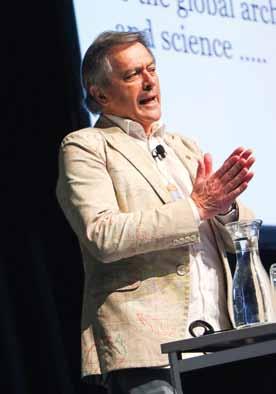
The smarter, electronic way to run key-based access control
eCliq is a wireless access control system which enables schools to regain and maintain control of their locking system.
It may be surprising that one of the most sophisticated, up-to-date access and security devices looks, at first glance, like one of the oldest. Based on the traditional lock and key, eCLIQ retrofits seamlessly into existing locking systems; cylinders are made to the same dimensions, and all electronics are self-contained, powered by a battery within the key. • Lost keys – Block or eliminate any lost or stolen keys to maintain the integrity of your system without having to replace the locks • No wiring – Gain the functionality of access control without the hassle and expense • Audit trails – See who opened what door and when • Change access – Easily change a person’s access rights by sending information to their key • Schedule access – Control the time periods when keys are operational

Key to Success
More durable, more secure and more efficient than conventional locking systems

Hundreds of school principals line up to register at the rotorua Conference
navigators and were guided by their knowledge of the stars. They had learned to read the winds, waves and sea currents and closely observed the behaviours of the sea creatures and birds. These natural phenomena became their tools of navigation. They used their relationships with the land and sea, which were already integral to their survival and success. For hundreds of years, they explored the Pacific Islands of Samoa, Tonga, Fiji, Rarotonga, Tahiti, Hawaii and Rapa Nui Easter Island. They even explored areas of South America.
About 1,000 years ago, Kupe set sail from Hawaiiki in a double-hulled waka, to find Aotearoa. He already knew it was there, but he would travel many thousands of kilometres across the Pacific to reach it. Like his ancestors before him, he too used the stars, winds and bird behaviour to navigate to the new land. Beyond this there was a whole new wave of migration across the Pacific Ocean but it would be another 500 years (1769) before Captain James Cook turned up, under the guidance of Tahitian navigator Tupaia. He followed in Kupe’s footsteps. Whalers and sealers were the next arrivals and many more who made New Zealand their home.
Taylor believes this extraordinary story has to be told and made available to all. That is why he set up the Mātauranga online learning platform, to help tamariki learn from the past to navigate the future. The platform is a valuable collection of engaging videos showing that science, technology, engineering and mathematics are part of a much bigger world view called Mātauranga.
Taylor demystifies these subjects for tamariki, by showing their practical application in the real world of ancient navigation. In this way, tamariki can see the continuum of these scientific understandings through to today where innovative Kiwis are sending state of the art ‘waka’ (rockets) to the very stars that brought us here in the first place.
‘When Bill Bryson journeyed through time and space to create his masterpiece “A short history of nearly everything”, he epitomised the concept of Mātauranga,’ said Taylor.
It was no surprise that Taylor took the opportunity to lay down a fierce ‘wero’ to the academics of Auckland University who say Mātauranga is not science. ‘They need to rethink their perspective that indigenous knowledge is not science’, he said, ‘or they can pack their bags and go home to the planet of Wokerati’. This practice of failing to acknowledge the value of indigenous knowledges is intolerable from Taylor’s point of view and steeped in notions of elitism and racism.
They lead to outrageous statements such as:
‘Māori have benefited from colonisation lifting them out of
Dear Principal
Are you struggling, trying to get your students moving? Have you ever wondered how to get the kids active, in a way that is fun and engaging? New technology is finally here! Let us introduce the exciting Multi Ball!
The Multi Ball wall offers E3: education, entertainment & exercise. We have over 30 games on offer, some are for math and geography, and we have a new memory game in Te Reo! This is about getting our kids engaged and moving! Are the PTA looking for a fundraising project? Please click on the below code to see the exciting YouTube video!
Please contact me at edenstevenson@yahoo.co.nz or p 027 477 3963 to discuss the exciting opportunities for your school. Eden Stevenson, Mixed Reality Sports
mixedrealitysports.co.nz
a violent stone age existence.’ (Don Brash – One Treaty One Nation)
‘ . . . many things that came after Cook massively enriched the lives of the inhabitants – protein-rich food, the written word, metals, the wheel, access to the global archives of literature, religion, music, science and stories . . . (Paul Goldsmith, National Party Spokesperson on Education).
It is outdated, racist attitudes such as these that Taylor wants to replace with positive thinking, collaborative teams, looking forward futuristically to create innovative solutions to the world’s problems. One needs to look no further than his own company, ARL, which exemplifies these values and ideals, whilst holding steadfastly to the ancient knowledges of where his people came from, how they got here and where they are going now.
bali Haque, Chair Tomorrow’s Schools Task Force The title of Bali Haque’s presentation Our Schooling Futures: Stronger Together, Whiria Ngā Kura Tūātinitini, had a familiar ring for the audience of 600 school principals. It is the title of the final report of the Tomorrow’s Schools Independent Taskforce.
Haque has held several high-profile positions across his career in education, including as Deputy CE of the NZQA, where he led major NCEA reforms. He is currently a member of the Board of Ako Mātātupu/Teach First New Zealand, which is focused on addressing inequities in the education system, especially those facing Māori and Pacific communities. But it is his earlier career in secondary school principalship that gives him such high credibility and trust with the schooling sector. It was therefore not surprising that the Minister appointed him to Chair the Independent Taskforce to review Tomorrow’s Schools.
The Tomorrow’s Schools review was well overdue. Cracks had been appearing for many years. Whilst few principals would wish to relinquish the self-managing schools’ model, many realised that inequities had crept in. Inequities existed both between and within schools. The decile system of funding was a contributing factor to between school inequities. Parents incorrectly judged that high decile meant excellence and low decile, the opposite. A drift from low to high decile schools gained momentum, in part exacerbated by principals of high decile schools happy to increase their roll sizes to have more flexibility in the use of their resources. The competition between schools was palpable and growth of inequities inevitable. Such an environment is not conducive to collaboration and connections between principals were being severed. The role of the principal was also becoming increasingly complex and compliance issues were stifling many. Principals felt unsupported as their workloads grew exponentially.
Haque nailed the within schools inequities quoting from a statement by the State Services Commissions 2016, “ . . . there is too much variation in learner achievement with long standing problems for particular learners and learning populations like
Māori and Pasifika. Adoption of good practice is almost always referred to as patchy and the uptake of promising innovation is seen as slow to spread across the system. There are too many systemic weaknesses in the way funding information and talent are developed and deployed to be confident that the good results we do see are the result of good system performance rather than personality or situation specific.” The Independent Taskforce, established in the wake of the 2017 Labour Government’s countrywide conversations on the future of education, published its report in 2018. It identified ten systemic problems: 1. Highly devolved, one size fits all 2. Highly centralised 3. Compliance driven bali Haque encourages principals to follow 4. Low trust top down up on the Cabinet Paper that includes all the 5. Consumer choice for some recommendations of the Tomorrow’s Schools report 6. Kura Kaupapa Māori Pathways 7. Post code driven 8. Incoherent PLD 9. No action on leadership 10. Mary Pop In school review Once you get rolling with Science in Motion...
SCIENCE LESSONS
ARE SIMPLE! • Easy, fun activity plans for Years 1-10 • Build science capabilities and concepts. For more info check out
www.education.nzta.govt.nz/science
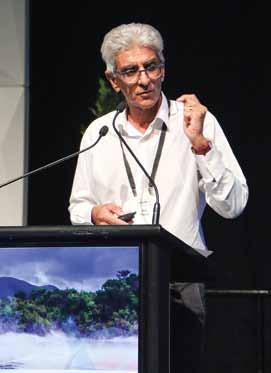



Get students engaged in STEM learning with free online resources, lesson plans and activities from School-gen
• NZ curriculum-based activities for Years 1-13 • Designed by teachers • Kids have fun while learning
Find out more at
schoolgen.co.nz
As a result, there were 32 recommendations put to the Minister, but not all of the recommendations were accepted by Cabinet. One major omission was the recommendation to establish hubs which would reduce the powers and functions of Boards of Trustees, would employ principals and deliver a range of services to schools including business services. This would substantially reduce the compliance and property management functions, freeing principals to focus on leading the learning in their schools.
An NZPF survey of members found principals were not supportive of hubs, and these were omitted from the Cabinet paper.
Haque explained that many of the recommendations,

Although not creating too much of a threat for Pink Floyd, business Partners, Photolife, put on a priceless rendition of “we don’t need no education” to entertain the troops
especially those addressing inequality, were however included in the Cabinet papers, and he urged principals to prioritise them, read them thoroughly and discuss them at regional meetings, then monitor the changes as they occur, he said, and be prepared to hold the Minister and officials to account.
He outlined four important observations: 1. We must double down on our purpose 2. We must focus at this time on how the system delivers for everyone 3. We can do it 4. We should assume good will on all sides. He also had some specific questions for principals to ponder about the impending Curriculum Centre. ■ Is the curriculum centre responsible for the national curriculum? ■ Are the people working on the Records of Learning and
Progress and Achievement ‘road map’ and the people rewriting the curriculum regularly talking and planning together? ■ Are the appropriate Assessment tools being concurrently developed – and tested for reliability validity and workload? ■ How will the newly created progress and achievement markers not turn into another version of National
Standards? ■ Will the proposed ‘Know, Understand and Do’ template, used for NZ histories work for all learning areas? ■ Is the bicultural lens to the refreshed curriculum being thought through?
■ What is the PLD for the refreshed curriculum going to look like? What is the balance between online and face to face mentoring and support? ■ What role do school principals have in all this? The questions were entirely relevant. It was also clear that many principals had not yet considered them. No matter what their current workload, these questions were clearly too important not to prioritise. They encapsulated the future shape of NZ’s school curriculum, which was likely to be embedded for many years to come. Haque’s clear message was ‘Now is the time to get it right’.
To open Day three of the conference principals were called to attention by the Forte Choir from Western Heights High School. Adding a touch of humorous drama to their routine, these young men and women gave a polished performance, warming the hearts of the attentive audience.
Rawiri waru Bedecked in his street jacket and jeans, cradling his guitar under one arm, and smiling in the manner of an impish teen, Rawiri Waru strolled to the stage and immediately owned it. He turned, greeted his audience in Māori, then launched into his korero.
‘You’ve heard about Black Lives Matter in the U.S. and how Erec Smith started Free Black Thought,’ he said, ‘and it’s easy to think, well, this is about freeing black people from poverty and other social snags.’
‘But black people are not all the same. They are not all in poverty. They don’t all interpret experiences the same way. There is no such thing as a “black perspective” on anything. There are 40 million black narratives, and if you look at other ethnicities, it’s like that for them too, so don’t put us into boxes’ he said. And there, laid bare, was his first challenge. Waru then strapped his guitar on and sang his own waiata, ‘ . . . change is gonna come, oh yes it will . . . ’ he belted out to his bemused audience.
‘I hope that woke you up a bit,’ he teased.
The title of his address was He Kura He Kura He Kura.
Kura, he said, has many meanings including, to glow; a place of learning; red ochre; something very precious; glow of the morn; sunlight.
‘My Kura was my marae, growing up in Ohinemutu, with my grandparents,’ he explained. He was seven or eight before he attended school.
‘I had learned so much before I went to school, but all that didn’t mean anything at school, so I thought I must be dumb,’ he said.
Attending school became synonymous with running away from school, for Waru. ‘There were some great teachers at school, but the Pā was my real school and so I’d run away again and again and be dragged back each time,’ he said.
‘Why would I want to go to school? The mātauranga of the marae had everything. There was something for everyone,’ he said.
During this time, music and sport became important in his life and his father arranged piano lessons with the Catholic nuns so he could learn to read music.
He took an entire year off during the Intermediate school years but at High School, he met Mr Woon. ‘He brought me back to school once and sat me down to ask me, “How do you think your ancestors got here?” “Do you think they just floated here?” No, they knew the winds, the currents and watched the birds. They had sails made from Coco leaves. Your ancestors were scientists,’ he said. For the first time, Waru felt he could connect. School began to make sense for him because it matched what he had already learned from his nan and others at the marae. Mr Woon challenged him to make a scientific model and enter a national competition. ‘I can tell you now,’ he confided to his audience, ‘that I won and beat Jacinda Ardern!’ This was the beginning of a long and successful scientific career, for Waru, which took him, at the age of 18, to the Conference of the Worldwide Young Researchers for the Environment in Hanover, Germany, in 2000.
‘This was a global science competition. My study was on
rawiri waru belts out a waiata of his own from the stage
Next Steps The Adventures of Team Turbo 36 easy-to-read paperbacks, levels 17–27 • Short chapters to maintain reader interest • Innovative text features and graphic elements • Recurring characters who students can identify with • A text type focus and a rap in each book • Three-day lesson plans and worksheets
FREE SAMPLE BOOK! SCAN HERE ORDER ONLINE:
www.sunshine.co.nz
PHONE: 09 525 3575 EMAIL: sales@sunshine.co.nz Wendy Pye Publishing Ltd 413 Great South Road, Ellerslie, Auckland 1051
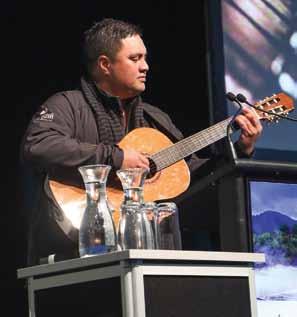
geothermal geysers and I was the only entrant from New Zealand,’ he said.
He then proceeded to entertain his audience with the hilarious and adventurous way he found his way to Hanover.
‘From the airport, I was instructed to take the train that said “Expo”. Well, every train said Expo, so I jumped on any train which of course was the wrong one. I arrived in this small little town which was not where I was supposed to be. I was lost. I had phone numbers to ring but nobody spoke English on the other end, so that didn’t help. And I had no German money to buy food or stay anywhere because I forgot to sort that at the airport. But I had my guitar so went busking and made €80. I thought that would be enough for a feed and a bed for the night, then a stranger called Bruno made friends with me and took me to his house. Meanwhile the Expo people thought I had been abducted, but a day or so later I got the right train and turned up in the right place in Hanover, €80 ahead!!’
The competition itself drew experts from across the globe, including one who became very interested in his graphs.
‘I see you have some graphs here,’ remarked the stranger.
‘Yes, I do,’ replied Waru. ‘I use Excel. Have you ever heard of Excel?’
‘I have,’ said the stranger. ‘Great to meet you. Bill’s the name, Bill Gates!’
He explained that this was the beginning of a wonderful friendship and Bill Gates introduced him to further volcanology researchers in Yellowstone, Japan, one of the world’s most dynamic volcanic systems.
‘From being invisible,’ he said, ‘I was now embracing everything I knew from my learning years on the marae, and bringing my mātauranga to volcanology,’ he said.
His next career step was supported with a scholarship from the Royal Society which took him to further science studies at Stanford University.
The future, according to Waru is for Mātauranga Māori and western ideologies to work in harmony. It is all about everyone benefitting from each other’s knowledge and strengths, he says. He promotes his own kaupapa, not just for his own people but for everyone in Aotearoa New Zealand to experience and enjoy. ‘I’m Scottish,’ he said, ‘as well as Māori.’
He also believes in the importance of whakapapa, understanding who you are, where you are from and where you are going.
‘Whakapapa and Mātauranga Māori are inextricably linked. In this regard, no discussion on Mātauranga Māori is complete without discussing the relationship between whakapapa and Mātauranga Māori.’
‘Mātauranga Māori is a cultural system of knowledge about everything that is important in the lives of the people,’ he said.
His success in the world of science and his own experience of cultural alienation in his early school days, have led him to pursue changes so that future rangatahi will not feel culturally alienated from education.
To achieve transformative change, we have to look to leadership, according to Waru. Transformational leadership, he said, is about modelling the way, enabling others to act, challenging the process, inspiring a shared vision and encouraging the heart. Waru has now partnered up with the Ministry of Education to help in the delivery of Te Ahu o te Reo Māori, based on a seven level te reo Māori competency framework called Ngā Taumata o Te Ahu o te Reo Māori. The five focus areas are the Local dialect, Use of language, Grammar, Curriculum and Revitalisation. The intention is to upskill 40,000 teachers in Te Reo Māori by 2024 through a 22 week-long course commitment. For this to be successful, he said, will require all of you, as school leaders, to be on board the waka and support your staff to participate in this transformational kaupapa. Waru also works through his own local iwi organisation Te Taumata o Ngāti Whakaue Iho Ake Trust, which was established by Ngāti Whakaue in 2005, to achieve the aspirations of the iwi in the areas of education, Te Reo and well-being. He has also worked with other tribal leaders, has advised Ministers, CEOs, various mayors and industry leaders. His sights are set on improving Te Reo Māori proficiency, normalising the language and sharing narratives and histories relevant to Aotearoa and to the system that supports the education of all students. Fiona mcmillan, employment Law specialist for the NZPF PASL scheme Fiona McMillan, Employment Lawyer for PASL Senior partner with Anderson Lloyd Lawyers, Dunedin, and specialist in Employment Law, Fiona McMillan has been the lead legal advisor for school principals for many years. She takes all the referral work for NZPF’s Principals’ [legal] Advice and Support (PASL) scheme. Her address to the conference was entitled ‘A Peak at PASL’ Fiona is aware that principals’ employment arrangements, as employees of their Boards, makes them vulnerable. NZSTA is much more likely to take the Board’s position in a dispute with the Principal and NZEI more likely to take the side of a teacher, should that be the site of relationship breakdown. Principals are basically left out in the cold. It is no wonder that the NZPF PASL scheme is so popular with principals. ‘We prefer to give advice, through our Hotline service, at the earliest opportunity,’ says McMillan, ‘so that we can de-escalate issues. If that isn’t possible and we take your case further, the PASL scheme gives you the buffer of $25,000 free legal advice,’ she said. Principals may well think that their employment relationship with the Board will never be an issue for them. Whilst this will hold for most principals most of the time, McMillan can attest that this is not always the case and when things turn ‘pear shaped’, they can get very ugly very quickly. ‘It can happen to any principal, anywhere,’ she said compellingly. A quick statistical summary showed that in the past year about 60 principals had received advice on matters affecting their
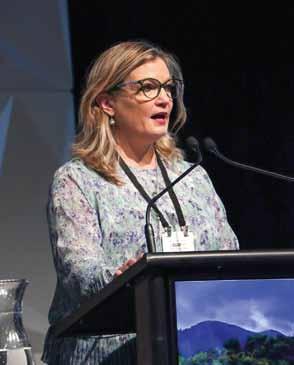
Given the challenges posed by COVID-19, Schools and their whānau have proved to be amazingly resilient over the last 18 months; learning to adapt, innovate and enhance learning experiences by quickly implementing online learning platforms. This has changed education forever, and driven the need for longer-term strategies and streamlined processes, throughout the rest of the school environment. With this in mind, timely and informative budgets play a vital role providing principals and boards with financial confidence during these uncertain times. A well-constructed budget can also provide opportunities, facilitating instant decision making when required. Budgets should not just be viewed in the context of the next 12 months, but also consider the schools longer term strategic goals; what does the board want to achieve in the next 5 to 10 years? This ensures that not only the children of today are benefiting from sound financial decisions, but future generations as well. Those future generations will also contribute to the community during the years ahead.
Given the importance of reliable financial information in order to deliver enhanced resources for students and teachers alike, schools need access to value-adding financial solutions and knowledgeable support. Choosing the right solution, along with engaging an experienced support provider, is critical.
When preparing an annual budget, every school is different and, as such, requires personalised assistance. Sound advice should provide suggestions around enhancing revenue and be considered when making some of the tough spending decisions. As part of the onboarding process at Accounting For Schools, we take a lot of time and care to understand a school’s specific requirements and needs. A comprehensive and accurate annual budget for the coming year should also consider the impacts on the years beyond as well. We have developed several cloud-based collaborative tools that include, customised budget templates, staffing calculators and asset replacement programmes. We are genuinely focused on the long-term future of all schools, not just the next few months.
A budget is only as good as the information available, however. At Accounting For Schools, we use the latest technology to provide insight and deliver confidence around the Schools finances. We utilise cloud-based accounting software, Xero, that can be accessed from anywhere. Xero provides accurate, understandable, and timely financial information. It also gives back control to the school, allowing payments to be made when required, management of categorising expenses, and the ability to collaborate with multiple invested partners.
When preparing financial information for schools, such as month management reports, we strive to provide understandable summarises of the key impacts, and how those impacts are now being managed. Our team of school experts provide timely support, genuine advice, and technical expertise to help schools make more informed decisions.
By utilising Xero, Google Drive and other cloud-based applications, Accounting For Schools can assist and support schools in any part of the country; we also enjoy travelling when we can. These systems also enable collaboration and allow us to deliver a more streamlined process, which ensures faster delivery for schools; which also extends to our annual accounts support process.
When it comes to the annual audit and the year-end financial statements, many schools find this a daunting and time-consuming exercise. At Accounting For Schools, we view audits as an excellent opportunity to review the school financials, not just a box-ticking exercise. We seek to filter the audit queries, mitigating needless disruption during an extremely busy time of the year for the school support team, and ensuring statutory deadlines are met.
Using Xero already? Mention this article and we will prepare a budget template in Xero for your school at no cost, and provide access to our budget training toolkit.
If your school needs in-depth assistance with regards to the 2022 annual budget, assistance with preparing a multiyear budget, enhanced monthly reporting, or just managing the year end accounts and audit, please contact Ben Duflou or Allison Henderson today for a no-obligation chat. We will be able to tailor a solution specific for the schools needs..
Accounting For Schools – www.afsl.nz.
Ph: 0800-ASK-AFS (0800-275-237)

employment and about 30 Board or operational matters were causing consternation for principals. There were also 17 files open which meant these cases were likely to go much further.
‘We step in if Boards are not following fair and proper process,’ she said, ‘or not following correct process in dealing with a parent complaint against the principal.’ ‘Our approach is always constructivism but not every Board wishes to be constructive,’ she said.
She outlined a case which did have a happy ending. A long serving, well regarded principal, who had already signalled her intention of retiring, inherited a new Board Chair and a new staff representative.
A set of complaints and concerns about the conduct of the principal were received just two weeks out from her retirement so PASL lawyers penned a letter for her to deliver to the Board. After a meeting or two with the new Board Chair, the complaints were withdrawn, there was no risk of mandatory reporting to the Teaching Council and all enjoyed a happy retirement party.
‘That was a case where we acted quickly and got the best outcome for the principal,’ said McMillan. ‘The complaints were baseless, but without quick action, could have festered and acquired legs,’ she said.
One of the weaknesses of the Board employing the principal is that there is no protection for the principal when baseless accusations are made. ‘I have seen so many cases where the principal has been hung out to dry over complaints that never did have any sound basis in the first place,’ she said. ‘When we
are notified early and can intervene straight away, we can usually get a reasonable response. When these matters are left to fester away, it can be much more difficult to reel them in,’ she said. She cited cases where minor issues had not been dealt with and grew into much bigger allegations. ‘The principal may have thought they would just go away, but instead they were getting worse.’ McMillan said the saddest examples were those where a principal has in the end just resigned, because they can’t take the pressure of continually fighting a case which should never have been brought against them in the first place. The fact that a principal has been under such scrutiny from a Board can also jeopardise their chances of future employment. ‘PASL,’ she said, ‘was one of the few protections that principals have available to them, unless they choose to join a private protection scheme.’ myles Ferris faces his own Te Akatea executive in acknowledgement of their haka to honour his achievements Fiona McMillan made herself available at the conference to meet with individual principals and assist those who wished to sign up for the scheme. NZPF Award of Service with distinction – Myles Ferris On rare occasions the NZPF Executive Committee receives a nomination to honour a member for extraordinary service. This year, Hayley Read from Northland nominated Myles Ferris, former President of Te Akatea Māori Principals’ Association, for his outstanding service to Māori principals and Māori education. Myles led Te Akatea whilst tumuaki of his own school, Te Kura o Otangarei, in Northland. During this time, he increased the membership of Te Akatea; in collaboration with Ministry officials, he made many gains for Māori principals; he built strong relationships with NZPF and proposed the constitutional change which places a Te Akatea Māori representative on the NZPF executive, as of right, to advise NZPF on all matters relating to Māori education. He also continued the advance of the highly successful Te Ara Hou, Māori Achievement Collaborations (MACs), the culturally transformational PLD programme for principals, which has been led by Te Akatea for the last 5 years and now serves in excess of 350 schools. Using his extensive networks, he was instrumental in engaging Dr Ann Milne to help work up the framework for the MACs which serves the programme so well. Myles has been influential in the international space for many years, alongside other indigenous groups, particularly those closer to home. He was also a key contributor to the conference, hosted by Te Akatea, for the National Aboriginal and Torres
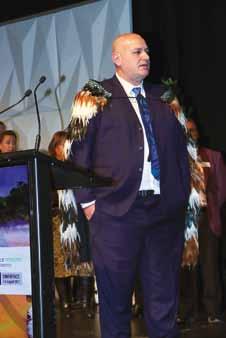
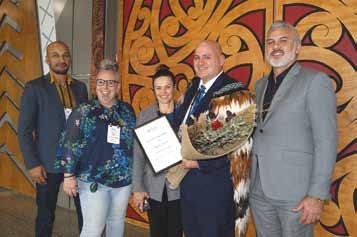
myles Ferris celebrates his special moment beside his wife malvina and members of the Te Akatea executive group myles Ferris receives his prestigious Service Award from President Perry rush
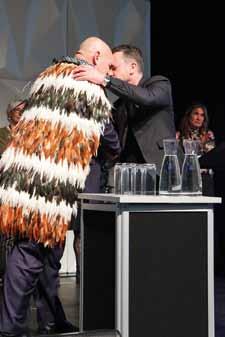
Strait Islander Principals’ Association (NATSIPA) in Waitangi.
His knowledge and understanding of Te Ao Māori are highly sought after and currently he is on secondment to the Ministry of Education and the Teaching Council working on leadership development for Māori kaiako and tumuaki in both Māori and English medium schools.
Most notably, Myles has the drive and the capacity to bridge the divide between Māori and Pākehā worlds, in the true spirit of Te Tiriti o Waitangi partnership, so that we can learn from each other and be stronger together. The whakatauki that best sums up Myles’ motivation is:
Ehara taku toa i te toa takitahi, engari he toa takitini.
My successes are not mine alone, they are ours, the greatest successes are those that we will have from working together. Myles proudly wore the korowai, lent to him by his own iwi, to receive his award. We congratulate Myles and thank him for his outstanding work on behalf of his colleagues. The Presidents Celebrate with Presidents’ drinks At every NZPF conference, the President of the day hosts an
NZPF Presidents reconnect: back row (L to r) Pat Newman (2005–2006), Iain Taylor (2016), ernie buutveld (2009–2010); middle row (L to r) whetu Cormick (2017–2019), Paul Drummond (2012), Peter Simpson (2011), Denise Torrey (2015); Front row (L to r) Perry rush (2020–2021), marilyn yeoman (1995–1997), Philip Harding (2013–2014) evening for special guests, business partners, former Presidents and life members. It is always a jolly event as old relationships are rekindled, and nostalgic stories shared. This year we were delighted that nine former NZPF Presidents responded to current President, Perry Rush’s invitation. The photo opportunity was irresistible.
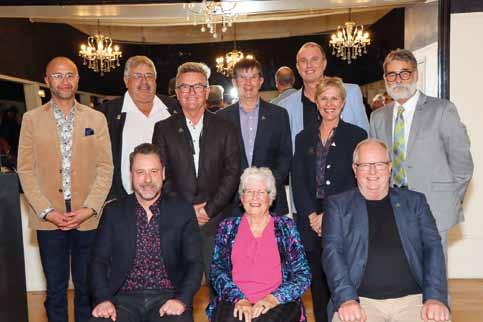

MC jehan Casinada Interviews young Leaders of the Future It was a stroke of genius by the conference organisers to invite eight student leaders from Rotorua High Schools to share their thoughts on their education and hopes for the future. The eight – Rohm Dixon and Paretoroa Webster-Tarei (Rotorua Boys’ High School), Helena Dou’ble and Hope Smith (Rotorua Girls’ High School), Zach Jans and Haeun Kang (Western Heights High School), and Isidora Gonzalez-Diaz and Aryan EmileChura (Rotorua Lakes High School) were unfazed by Casinada’s questioning, responding with confidence, thoughtfulness, clarity and optimism for their future.
In answer to how COVID lockdowns had affected them, Hope Smith was the first to offer her views saying, ‘The hardest part was not seeing friends and whānau and not being able to go to school.’ She observed that it was really hard learning on Zoom calls at home, especially when others of the family were watching TV or just chilling. Helena Dou’ble agreed it was also difficult for her but for different reasons. ‘I need order around what I am doing, and support. If its up to me I won’t do it,’ she admitted.
Paretoroa Webster-Tarei saw the effects of lockdown beyond his own schooling saying, ‘It hit our people in Rotorua hard. We are the heart of cultural tourism and we couldn’t support our families and showcase our culture,’ he said. ‘There were 150 staff members made redundant and received no payments,’ he said. Rhom Dixon added, ‘We had many boys who had to leave school to find jobs because parents lost jobs. These boys should be in school not in jobs,’ he added.
Casinada remarked, ‘We have no idea what kids are bringing to school, like work as well as responsibilities to families.’
Helena Dou’ble added, ‘In our culture we provide and put family first and it can be hard balancing that with school. My teachers, and friends took the weight off my shoulders.’
Aryan Emile-Chura said ‘A big part of our culture is to connect with each other as people so [with lockdown] there are underlying mental health issues which affect grades and at our school there is the problem of boys needing to get jobs. I know some personally – intelligent students dropping out to get jobs.’
Paretoroa Webster-Tarei said, ‘You could only have ten people at a tangi. I had to do the karakia for my Koro then take him to his family. We could not hongi or touch. It was hā mamao – long distance hongi.’
Casinada’s next question was about technology and Zoom sessions. People think it’s easy for kids, he said, is that true, he asked?
Isidora Gonzalez-Diaz said Zoom is good when you are studying at home and yes, we do know technology so it can be easier for us. ‘I take classics,’ she said, ‘and if you miss a day, you miss heaps. Having classes on zoom is great but it does
come down to access. If COVID comes again, how will we communicate? We can embrace technology, but it must be for all.’
Rhom Dixon added, ‘Many students rely on technology too much. With Google classrooms, school attendance goes down.’
Haeun Kang said, ‘Under COVID yes, technology is great, but our younger generation is too dependent on phones. We need to lock down the phones! Kids are coming back to school and not interacting with teachers.’
Casinada’s next question addressed school structure. ‘Do you want a structured school environment? Tell us about that. Have we moved too far?’
Paretoroa Webster-Tarei replied, ‘A little bit of structure is alright. With no structure, we do all the organising and learning by ourselves. Being independent is good,’ he said.
Zach Jans said, ‘It is preparing us for living our lives and being self-directed learners. It prepares us for the workforce. I do think that primary schools should be structured.’
Isidora Gonzalez-Diaz said ‘There has to be a middle point between structure and independence. You need some structure to prepare for university, but once you are there you have to do it on your own. We can’t come up with new ideas if we are completely structured.’
Casinada’s next question was to ask the panel what they saw as their issues.
Hope Smith answered that mental health in young people was
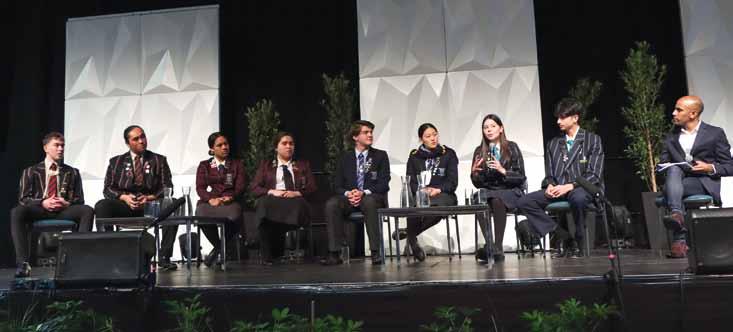
The Panel of young Leaders of the Future from rotorua High Schools: From Left to right: rohm Dixon and Paretoroa webster-Tarei (rotorua boys’ High School), Helena Dou’ble and Hope Smith (rotorua girls’ High School), Zach Jans and Haeun Kang (western Heights High School), and Isidora gonzalez-Diaz and Aryan emile-Chura (rotorua Lakes High School)





